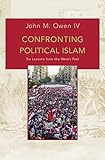Confronting Political Islam : Six Lessons from the West's Past / John M. Owen.
Material type: TextPublisher: Princeton, NJ : Princeton University Press, [2014]Copyright date: ©2014Edition: Course BookDescription: 1 online resource (232 p.) : 4 line illus. 6 tablesContent type:
TextPublisher: Princeton, NJ : Princeton University Press, [2014]Copyright date: ©2014Edition: Course BookDescription: 1 online resource (232 p.) : 4 line illus. 6 tablesContent type: - 9780691163147
- 9781400852154
- Islam and politics
- Islamic fundamentalism -- Political aspects
- Politischer Islam
- Geschichte
- Ideologie
- Konflikt
- Religion
- Vergleich
- POLITICAL SCIENCE / History & Theory
- Americas
- Catholics
- Christianity
- Dutch Republic
- Europe
- Iran
- Islamism
- Islamist states
- Middle East
- Muslim world
- Muslims
- Palatinate
- Protestantism
- Protestants
- Saudi Arabia
- Soviet Union
- Turkey
- United States
- communism
- communists
- constitutional democracy
- constitutional monarchism
- democratic capitalism
- exemplarism
- exemplary country
- fascism
- foreign interventions
- foreign policy
- hybrid regime
- ideological contests
- ideological movements
- ideology
- liberal conservatism
- liberal democracy
- liberalism
- monarchism
- monarchy
- monolith
- political Islam
- polylith
- public diplomacy
- rationality
- republicanism
- secularism
- socialists
- 320.557 23
- BP173.7
- online - DeGruyter
- Issued also in print.
| Item type | Current library | Call number | URL | Status | Notes | Barcode | |
|---|---|---|---|---|---|---|---|
 eBook
eBook
|
Biblioteca "Angelicum" Pont. Univ. S.Tommaso d'Aquino Nuvola online | online - DeGruyter (Browse shelf(Opens below)) | Online access | Not for loan (Accesso limitato) | Accesso per gli utenti autorizzati / Access for authorized users | (dgr)9781400852154 |
Browsing Biblioteca "Angelicum" Pont. Univ. S.Tommaso d'Aquino shelves, Shelving location: Nuvola online Close shelf browser (Hides shelf browser)

|

|

|

|

|

|

|
||
| online - DeGruyter The Age of the Crisis of Man : Thought and Fiction in America, 1933-1973 / | online - DeGruyter Rough Country : How Texas Became America's Most Powerful Bible-Belt State / | online - DeGruyter American Insecurity : Why Our Economic Fears Lead to Political Inaction / | online - DeGruyter Confronting Political Islam : Six Lessons from the West's Past / | online - DeGruyter Playing at Acquisitions : Behavioral Option Games / | online - DeGruyter The Princeton Companion to Atlantic History / | online - DeGruyter The Jews of Islam : Updated Edition / |
Frontmatter -- CONTENTS -- ILLUSTRATIONS. TABLES -- PREFACE -- Introduction. It Did Happen Here -- Lesson 1. Don't Sell Islamism Short -- Lesson 2. Ideologies Are (Usually) Not Monolithic -- Lesson 3. Foreign Interventions Are Normal -- Lesson 4. A State May Be Rational and Ideological at the Same Time -- Lesson 5. The Winner May Be "None of the Above" -- Lesson 6. Watch Turkey and Iran -- Conclusion. What to Do and What Not to Do -- NOTES -- BIBLIOGRAPHY -- INDEX
restricted access online access with authorization star
http://purl.org/coar/access_right/c_16ec
Political Islam has often been compared to ideological movements of the past such as fascism or Christian theocracy. But are such analogies valid? How should the Western world today respond to the challenges of political Islam? Taking an original approach to answer this question, Confronting Political Islam compares Islamism's struggle with secularism to other prolonged ideological clashes in Western history. By examining the past conflicts that have torn Europe and the Americas-and how they have been supported by underground networks, fomented radicalism and revolution, and triggered foreign interventions and international conflicts-John Owen draws six major lessons to demonstrate that much of what we think about political Islam is wrong.Owen focuses on the origins and dynamics of twentieth-century struggles among Communism, Fascism, and liberal democracy; the late eighteenth- and nineteenth-century contests between monarchism and republicanism; and the sixteenth- and seventeenth-century wars of religion between Catholics, Lutherans, Calvinists, and others. Owen then applies principles learned from the successes and mistakes of governments during these conflicts to the contemporary debates embroiling the Middle East. He concludes that ideological struggles last longer than most people presume; ideologies are not monolithic; foreign interventions are the norm; a state may be both rational and ideological; an ideology wins when states that exemplify it outperform other states across a range of measures; and the ideology that wins may be a surprise.Looking at the history of the Western world itself and the fraught questions over how societies should be ordered, Confronting Political Islam upends some of the conventional wisdom about the current upheavals in the Muslim world.
Issued also in print.
Mode of access: Internet via World Wide Web.
In English.
Description based on online resource; title from PDF title page (publisher's Web site, viewed 30. Aug 2021)


